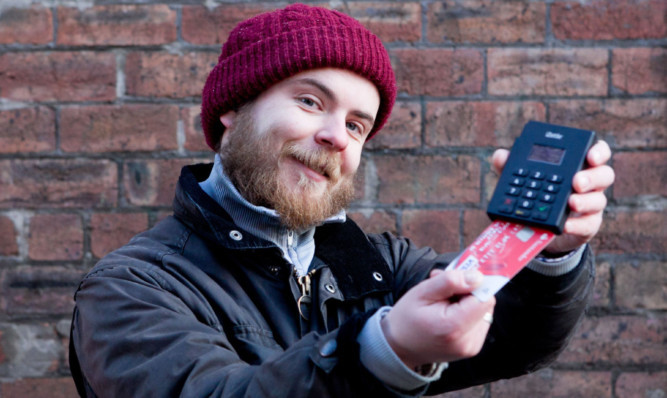
Plastic is a no-no on the high street when our man goes a-begging in Glasgow.
It simply beggars belief…but hi-tech tramps are now using chip and pin machines to take payments from shocked passers-by.
This week it was revealed Damien Preston-Booth travels from Preston, Lancs, to beg outside posh London restaurants using his chip and pin device.
He makes thousands targeting London’s rich and famous and there are warnings other so-called down and outs may also be using the card readers to take donations from people.
With that startling development in mind, an undercover Sunday Post reporter took a similar device which can be bought for as little as £49 online out on to the streets to find out just how willing people were to hand over their credit cards to would-be beggars.
Dressed in a shabby jacket and a maroon fisherman’s bunnet, our bearded hack first shambled to Glasgow’s trendy Byres Road.
Slumped yards from a posh Waitrose supermarket in the freezing snow, he attracted pitied looks until he fished out his portable payment machine.
“Spare some change…I take all cards, VISA, Mastercard, American Express,” was our man’s kerbside pitch.
Artist Dorte Pape wasn’t impressed. With other pedestrians whizzing by, barely able to hide their disgust as they tucked into their warming Starbucks lattes, Dorte told our investigative vagrant she would never consider slotting her card into such a device.
“This could easily be a scam,” said the 67-year-old, who said while she normally gave change to beggars, she wouldn’t be giving anything to our man.
Huddled against the biting winter wind, university lecturer Niall MacFarlane, 49, was equally unimpressed when our man successfully stopped him in the street only to fish out a chip reader.
“What happens if I only want to give 50p?” he asked, quickly thrusting his “shrapnel” change back into the pocket of his long black coat.
“We are constantly warned about identity theft,” he added. “And this could lead to more of it.”
Other beggars who considered bohemian Byres Road “their patch” were equally scathing.
They subjected our man to what could best be described as professional contempt, forcing him away from the main drag and into a quiet frost-mottled doorway.
Slumped on a square of cardboard to keep his bottom dry, and without a penny in his pocket, the pathetic surrounds did little to impress 18-year-old student Kasia Ritchie, who failed to hand over a penny.
“I’d definitely be worried about card cloning or someone running off with my card,” she said.
One person praised the ingenuity of the idea but was concerned it could create a security risk.
Retired business man Bill Robertson, 59, of Dumbreck, Glasgow, said: “I’m horrified but it’s very clever. It is the 21st century after all. But that seems like a scam waiting to happen.”
Our undercover reporter fared no better in down-to-earth Carlisle.
Lottery rep Susan McCade, 56, thought the idea of taking a card payment was “absolutely disgusting”.
Church minister Bill Kitchen, 80, of Glasson, near Wigton, Cumbria, added: “I think it’s crooked. It’s bad enough people begging on the streets but asking for credit cards is beyond a joke.”
With homeless charities concerned people living on the streets could be forced by criminal gangs to use these machines to elicit funds from people illegally, it’s clear there are still a number of issues around beggars using card readers.
Glasgow City Mission, which was founded in 1826 to support the city’s homeless, said: “People are on the streets for a whole host of reasons.
“It’s a very serious problem. We would be concerned that homeless people could become mules for criminal elements who might want to exploit them.
“We feel the best way to help people on the streets is to point them in the direction of homeless charities like ours.”
Police Scotland said: “Our advice would be that if you are unsure or suspicious of someone then you should report them to the police.”
Report by David Campbell

Enjoy the convenience of having The Sunday Post delivered as a digital ePaper straight to your smartphone, tablet or computer.
Subscribe for only £5.49 a month and enjoy all the benefits of the printed paper as a digital replica.
Subscribe